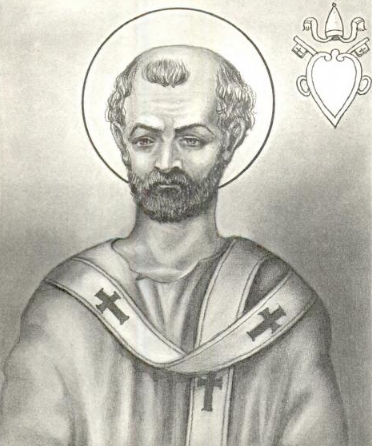The Lives and Times of the Popes - Saint Anicetus – A.D. 157
 On the 25th of July, A.D. 157, Saint Anicetus, a Syrian priest, son of John, was created pontiff. Between that pope and Saint Polycarp, Bishop of Smyrna, there was a great controversy, which divided them in opinion, but did not disturb their friendship. It was upon the subject of the celebration of Easter. Anicetus followed the tradition of Saint Peter, in celebrating Easter on the Sunday following the fourteenth day of the moon of the vernal equinox. Saint Polycarp, on the contrary, preferred the tradition of the Apostle Saint John, celebrating on the day of that full moon, which sometimes fell on a week-day. The bishops of Asia did not agree upon that subject with the Roman Church. That question was subsequently decided, as we shall relate in the life of Saint Victor I. This difference of opinion did not cause any breach of friendship. On one occasion, Anicetus even yielded to Polycarp the honor of offering up the sacrifice of the Mass. Anicetus had the ability to preserve his flock from the poison of error, and to keep the great trust of the faith in all its purity. By his vigilance he suppressed the heresies of Valentinus and of Marcion.
On the 25th of July, A.D. 157, Saint Anicetus, a Syrian priest, son of John, was created pontiff. Between that pope and Saint Polycarp, Bishop of Smyrna, there was a great controversy, which divided them in opinion, but did not disturb their friendship. It was upon the subject of the celebration of Easter. Anicetus followed the tradition of Saint Peter, in celebrating Easter on the Sunday following the fourteenth day of the moon of the vernal equinox. Saint Polycarp, on the contrary, preferred the tradition of the Apostle Saint John, celebrating on the day of that full moon, which sometimes fell on a week-day. The bishops of Asia did not agree upon that subject with the Roman Church. That question was subsequently decided, as we shall relate in the life of Saint Victor I. This difference of opinion did not cause any breach of friendship. On one occasion, Anicetus even yielded to Polycarp the honor of offering up the sacrifice of the Mass. Anicetus had the ability to preserve his flock from the poison of error, and to keep the great trust of the faith in all its purity. By his vigilance he suppressed the heresies of Valentinus and of Marcion.
Saint Anicetus suffered martyrdom in the year 168. In five ordinations he created nine bishops, seventeen priests, and fourteen deacons. He governed the Church nearly eleven years. His remains, which for fourteen hundred and twenty-nine years had rested in the cemetery of Calixtus, are at present venerated in the chapel of the Altemps palace at Rome, where they were deposited on the 28th of October, 1604. This favor was granted, by the Pope Clement VIII, to the prince, John Angelo, Duke of Altemps.
- from "The Lives and Times of the Popes", by Alexis-François Artaud de Montor
 On the 25th of July, A.D. 157, Saint Anicetus, a Syrian priest, son of John, was created pontiff. Between that pope and Saint Polycarp, Bishop of Smyrna, there was a great controversy, which divided them in opinion, but did not disturb their friendship. It was upon the subject of the celebration of Easter. Anicetus followed the tradition of Saint Peter, in celebrating Easter on the Sunday following the fourteenth day of the moon of the vernal equinox. Saint Polycarp, on the contrary, preferred the tradition of the Apostle Saint John, celebrating on the day of that full moon, which sometimes fell on a week-day. The bishops of Asia did not agree upon that subject with the Roman Church. That question was subsequently decided, as we shall relate in the life of Saint Victor I. This difference of opinion did not cause any breach of friendship. On one occasion, Anicetus even yielded to Polycarp the honor of offering up the sacrifice of the Mass. Anicetus had the ability to preserve his flock from the poison of error, and to keep the great trust of the faith in all its purity. By his vigilance he suppressed the heresies of Valentinus and of Marcion.
On the 25th of July, A.D. 157, Saint Anicetus, a Syrian priest, son of John, was created pontiff. Between that pope and Saint Polycarp, Bishop of Smyrna, there was a great controversy, which divided them in opinion, but did not disturb their friendship. It was upon the subject of the celebration of Easter. Anicetus followed the tradition of Saint Peter, in celebrating Easter on the Sunday following the fourteenth day of the moon of the vernal equinox. Saint Polycarp, on the contrary, preferred the tradition of the Apostle Saint John, celebrating on the day of that full moon, which sometimes fell on a week-day. The bishops of Asia did not agree upon that subject with the Roman Church. That question was subsequently decided, as we shall relate in the life of Saint Victor I. This difference of opinion did not cause any breach of friendship. On one occasion, Anicetus even yielded to Polycarp the honor of offering up the sacrifice of the Mass. Anicetus had the ability to preserve his flock from the poison of error, and to keep the great trust of the faith in all its purity. By his vigilance he suppressed the heresies of Valentinus and of Marcion.